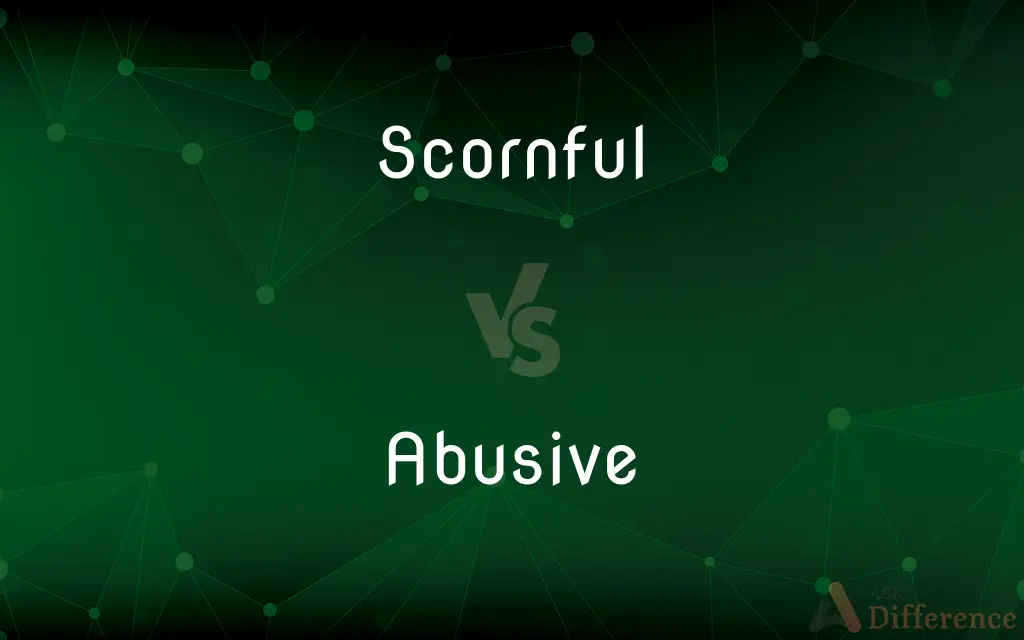Scornful vs. Abusive — What's the Difference?
Edited by Tayyaba Rehman — By Fiza Rafique — Updated on April 27, 2024
Scornful describes disdainful or contemptuous behavior, while abusive involves harmful or insulting actions or language.

Difference Between Scornful and Abusive
Table of Contents
ADVERTISEMENT
Key Differences
Scornful behavior is characterized by expressions of disdain or contempt, often showing a lack of respect towards someone or something. On the other hand, abusive behavior involves actions or words that are harmful, insulting, and intended to cause emotional or physical pain.
When someone is scornful, they might use sarcasm, mockery, or derisive comments to belittle another person, emphasizing a perceived superiority or disapproval. Conversely, abusive behavior can include yelling, swearing, threatening, or demeaning language that aims to dominate or hurt another individual.
Scornful attitudes are often conveyed through body language, such as rolling eyes, scoffing, or dismissive gestures, which subtly communicate contempt. In contrast, abusive actions can be more overt and aggressive, including physical violence or the deliberate infliction of psychological trauma.
The intent behind scornful remarks is typically to express disapproval or ridicule, potentially as a defensive or superior stance. Whereas the intent of abusive behavior is to control, intimidate, or inflict damage, often stemming from deeper issues of power or insecurity.
In terms of relationships, scornful comments can erode feelings of respect and understanding, but they do not always constitute abuse. However, consistent abusive behavior in relationships can lead to significant emotional or physical harm, and often requires intervention or support services.
ADVERTISEMENT
Comparison Chart
Definition
Expressing disdain or contempt
Involving harm or insults
Behavioral Expression
Sarcasm, mockery, dismissive gestures
Yelling, swearing, physical violence
Intent
To belittle or ridicule
To control, hurt, or intimidate
Impact
Erodes respect and understanding
Causes psychological or physical harm
Setting
Can occur in casual or formal interactions
Often occurs in close relationships
Compare with Definitions
Scornful
Showing open disrespect or contempt.
His scornful laugh made her question her own opinion.
Abusive
Involving verbal or physical actions that intimidate or hurt.
Abusive treatment at work can lead to severe stress.
Scornful
Characterized by mocking or cynical remarks.
She replied with a scornful remark that silenced the room.
Abusive
Utilizing insults or threats to manipulate others.
She felt trapped in the relationship because of his abusive threats.
Scornful
Using body language or tone to convey contempt.
Her scornful glance was more hurtful than words.
Abusive
Resulting in emotional or physical damage.
The child showed signs of distress from the abusive environment.
Scornful
Displaying superiority and disdain towards others.
His scornful attitude towards beginners at work is off-putting.
Abusive
Characterized by the misuse of power in relationships.
His abusive control over family finances was troubling.
Scornful
Engaging in behavior that dismisses others' ideas or feelings.
He was scornful of the proposal, calling it naive.
Abusive
Engaging in behavior that is harmful and offensive.
The abusive language used in the argument escalated the conflict.
Scornful
Contempt or disdain felt toward a person or object considered despicable or unworthy
Viewed his rivals with scorn.
Abusive
Extremely offensive and insulting
The goalkeeper was sent off for using abusive language
He became quite abusive and swore at her
Scornful
The expression of such an attitude in behavior or speech; derision
Heaped scorn upon his rivals.
Abusive
Engaging in or characterized by habitual violence and cruelty
An abusive relationship
Abusive parents
Scornful
The state of being despised or dishonored
Held in scorn by his rivals.
Abusive
Involving injustice or illegality
The abusive and predatory practices of businesses
Scornful
(Archaic) One spoken of or treated with contempt.
Abusive
Characterized by improper or wrongful use
Abusive utilization of public funds.
Scornful
To consider or treat as contemptible or unworthy
An artist who was scorned by conservative critics.
Abusive
Using or containing insulting or hurtful language
Finally reprimanded the abusive colleague.
Scornful
To reject or refuse with derision
Scorned their offer of help.
Abusive
Causing physical injury to another
Abusive punishment.
Scornful
To consider or reject (doing something) as beneath one's dignity
"She disapproved so heartily of Flora's plan that she would have scorned to assist in the concoction of a single oily sentence" (Stella Gibbons).
Abusive
Prone to treat someone badly by coarse, insulting words or other maltreatment; vituperative; reproachful; scurrilous.
All they could ever do was to shout abusive inanities at me and my colleagues.
Scornful
Showing scorn or disrespect; contemptuous.
Abusive
(obsolete) Tending to deceive; fraudulent.
Scornful
Full of scorn or contempt; contemptuous; disdainful.
Scornful of winter's frost and summer's sun.
Dart not scornful glances from those eyes.
Abusive
(archaic) Tending to misuse; practising or containing abuse.
Scornful
Treated with scorn; exciting scorn.
The scornful mark of every open eye.
Abusive
Being physically or emotionally injurious; characterized by repeated violence or other abuse.
Scornful
Expressing extreme contempt
Abusive
Wrongly used; perverted; misapplied; unjust; illegal.
Scornful
Expressing offensive reproach
Abusive
(archaic) Catachrestic.
Abusive
Wrongly used; perverted; misapplied.
I am . . . necessitated to use the word Parliament improperly, according to the abusive acceptation thereof.
Abusive
Given to misusing; also, full of abuses.
Abusive
Practicing abuse; prone to ill treat by coarse, insulting words or by other ill usage; as, an abusive author; an abusive fellow.
Abusive
Containing abuse, or serving as the instrument of abuse; vituperative; reproachful; scurrilous.
Abusive
Tending to deceive; fraudulent; cheating.
Abusive
Expressing offensive reproach
Abusive
Characterized by physical or psychological maltreatment;
Abusive punishment
Argued...that foster homes are abusive
Common Curiosities
Can scornful behavior become abusive?
While scornful behavior can be hurtful, it becomes abusive when it involves consistent harm or attempts to control another person.
What does it mean to be scornful?
Being scornful involves displaying disdain or contempt, often through sarcasm or dismissive behavior.
What are the consequences of abusive behavior?
Abusive behavior can lead to significant emotional, psychological, and physical damage, requiring intervention and support.
Can abusive behavior be rehabilitated?
With appropriate intervention, counseling, and support, individuals exhibiting abusive behavior can work towards rehabilitation.
How can organizations prevent abusive behavior?
Organizations can prevent abusive behavior through strict policies, training sessions on conduct, and mechanisms for reporting and addressing grievances.
What characterizes abusive behavior?
Abusive behavior includes actions or language that are harmful, insulting, and intended to control or injure others.
How can one respond to scornful remarks?
Responding to scornful remarks involves maintaining dignity, addressing the disrespect directly, or disengaging from the negative interaction.
Is it common for scornful people to also be abusive?
While not all scornful individuals are abusive, persistent scorn can escalate into abusive dynamics if it involves control or harm.
How do societal attitudes affect perceptions of scornful versus abusive behavior?
Societal attitudes can normalize scornful behavior in certain contexts, whereas abusive behavior is increasingly recognized and condemned.
What should one do if facing abusive behavior?
It is important to seek help from trusted individuals, support services, or legal authorities if facing abusive behavior.
What is the role of communication in dealing with scornful or abusive behavior?
Open and assertive communication is crucial in addressing and resolving issues related to both scornful and abusive behavior.
Is there a psychological basis for scornful behavior?
Scornful behavior may stem from feelings of insecurity, superiority, or defensive mechanisms, often requiring personal reflection or therapy to address underlying issues.
How do the impacts of scornful and abusive behavior differ in the workplace?
Scornful behavior can undermine morale and productivity, whereas abusive behavior can lead to serious legal and psychological consequences.
Are there specific laws addressing abusive behavior?
Many jurisdictions have laws that address abusive behavior, including domestic violence and workplace harassment.
What resources are available for victims of abuse?
Resources for abuse victims include hotlines, counseling services, support groups, and legal aid services.
Share Your Discovery

Previous Comparison
Bobcat vs. Lynx
Next Comparison
Contentment vs. ContentednessAuthor Spotlight
Written by
Fiza RafiqueFiza Rafique is a skilled content writer at AskDifference.com, where she meticulously refines and enhances written pieces. Drawing from her vast editorial expertise, Fiza ensures clarity, accuracy, and precision in every article. Passionate about language, she continually seeks to elevate the quality of content for readers worldwide.
Edited by
Tayyaba RehmanTayyaba Rehman is a distinguished writer, currently serving as a primary contributor to askdifference.com. As a researcher in semantics and etymology, Tayyaba's passion for the complexity of languages and their distinctions has found a perfect home on the platform. Tayyaba delves into the intricacies of language, distinguishing between commonly confused words and phrases, thereby providing clarity for readers worldwide.
















































